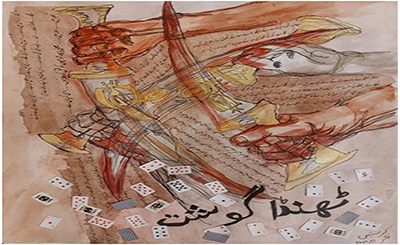

Song and Symphony
And so it was I entered the broken world
To trace the visionary company of love…
— Hart Crane
Overture: Rainbow in Balata
A story for you —
in late afternoon drizzle
coming home through familiar Balata
its blossoming gardens of mangoes, gloricidia
and palms’ branches like multi-winged cherubim — in that light
a huge rainbow, close as heaven, spectrum a palette
of red to indigo with her sister violet,
and I saw the end down a footpath
settled like a full-bodied beauty on a bench
under a breadfruit tree, there off Balata —
this true story is for you and the un-looked-for embrace
of the arms of your tender-hued interest
which surprised me, coming round this bend, like that arc-en-ciel.
*
1st Movement
which surprised me, coming round this bend, like that arc-en-ciel —
oh, let us not leave too early the crotons and embracing coralita
around the garden seat, the refracting light, not till
we have to, we must, not till I’ve looked enough at you, separate
and particular, to find my fool of a fantasy
my forbidden improbabilities, my illiterate
ignorant, simpleton desire
flashing, at least for a startling instant between us
like the last sunlight of the day off the unruly bougainvillea
and the intrusive, beckoning band of your ring
and the intrusive, beckoning band of your ring
extent and boundary of my fancies —
stripped to the soul of things
after the pouting bridesmaids, obligatory dances
leering innuendos, begins the marrying of souls
in sacred ceremony, begins the long quest for entrances
to us, and when, at last, we note the viola’s insistent echo
from whatever morne or valley, of the one lip
like the one name, that is ours to sing, we go
in, to the heart of the matter of, yes my love, love
in, to the heart of the matter of, yes my love, love
despite cynical academies, gossiping sidewalks
and wary pews, oh, let us not leave
too soon our fervent faces, our eyes plotting topographies
of these new maps like amateur cartographers
clambering hand and foot over these rocks
these protuberances of limiting biographies
these harbingers of coming failure
oh, let us not leave these arms, hollow and faithless
till we come beyond us, in sight of ourselves, waiting
till we come beyond us, in sight of ourselves, waiting
coupled, singular, familiar
in Love, without ambiguous twilight —
do not say, from the garden’s crepuscular
shadows, between the last settling cedar blossoms
‘you are funny…didn’t know you were mystical’ —
you doubt the reason of love’s awesome
revelations? you know the transfigured companion
at ease upon your breast?you think consummation
ends here, in the tossed sheets of your ego?
ends here, in the tossed sheets of your ego
the first road, the simple path, the blessed erotic —
can you take the Purgatorio
in black and blue of solitary guitars
desperate, hoarse trombones
and over dangerous city alleys, wailing reggae?
oh darling, let us hear now the spiralling symphonies
and songs, in keys major or minor
of our earth’s orchestrated premonitions
the chastening chords of dark passages, the discordant notes
*
2nd Movement
the chastening chords of dark passages, the discordant notes
the end of prostrate, purging interludes of sorrow
and after, with patient hand, here you are, you’ve waited
our days turned around and over, yesterday, tomorrow
brief, certain now and I remember, do you,
across the valley, the viola’s echo
and that epiphanic evening of the garden rainbow
when we knew us in Love’s unambiguous Light
oh, don’t say you have forgotten that promise of Paradiso
the beatific heart of the matter of, yes my faithful love, love
the beatific heart of the matter of, yes my faithful love, love —
in the mean time, the blessed declining ordinary:
broom-seller at the corner, karaoke bar above
the grocery, raisin bread and custards from Coral Street
for your tea, measuring medications
nodding over the evening news, settling our backs into our corners —
can this make a song, a certain melody
drawn from your old guitar, this companionship
soft, aromatic as aging incense, these remembrances
that persistent chord coming through the hibiscus hedge
that persistent chord coming through the hibiscus hedge
like a Patrick St. Eloi tender mazouk —
come, shake the legs free of this age
its idolatry of death, crutches of belly-aching
damned numbing noise without living rhythm
paralysis of those who limp with crippling pride in their dark
come, a last close rubadub to bass and drum
heart near to heart, breast to lifting breast
and oh, we’ve kept it all, we’ve kept the time —
now let us go in, leave the dark garden
now let us go in, leave the dark garden
to the coralita, crotons and fragrance of spider lilies
guavas and golden apples somewhere in their shadows; again
I hear the distant orchestra’s echo, strings and horns, a solo
cantor and, do you hear, our name in the song —
come the threshold of night, we shall meet ourselves
in Love, without ambiguous twilight, coupled, singular
familiar, embraced at doorways in Light
of rainbows, separate and particular, and leave behind forever
the sliver season of the moon
*
Finale: “the sliver-season of the moon”
the sliver-season of the moon
has come round again
over the hill-quarter of Monier —
from Grande Rivière the avenue
climbs through blossoming Lent:
yellow avocado, goldenbrowning menorahs
of mango, the exuberant
lavender of glory cedar;
below the roofs and branches
fluorescent Corinth and Marisule edge
the evening ocean —
your love returns
certain as the lunar’s phasing of its age
as the pulsing of hearts and petals
as the approaching bulk of hill
grows itself a dark wedge
against the sliver-season of the moon.
The difficult I’ll do right now
The impossible will take a little while.
— Billie Holiday
White Cedar
in Memoriam Derek Walcott 1930-2017: a glosa
Make room for the accommodation of the dead,
their mounds that multiply by the furrowing sea,
not in the torch-lit catacombs of your head
but by the almond-bright, spume-blown cemetery.
—Derek Walcott, The Prodigal, 9
I.
I thought it was over, the season of lilac carpets
along verges, on green lawns,
petals of powyé stepping off currents
of soft air, settling with tender ease to earth’s lanes —
but here they are again, in May, everywhere,
with the mourning bassoon of wood doves, and yes indeed,
incredibly, to me ignorant of seasons of flora,
I see the fragrant Easter spider-lily
blooming from unexpected corners of my without-you days.
“Make room for the accommodation of the dead,”
II.
you muttered, in a dark saying
that seemed to mute memory,
to remove yourself to needle-leaved casuarinas
of Pigeon Island, out of our too familiar embrace,
too smothering adulation, our burrowing eyes
searching out your diaries —
and the cascading cedar blossoms
race the grey heron to surf-chastened ledges of Becune Point
the forlorn pool, deserted studio, vacant easel,
their mounds that multiply by the furrowing sea,
III.
after gentle curtsies through golden late afternoons
to lakonmèt and Martiniquan mazouk,
past delicate carvings of white-cedar figurines
in the sculptor’s garden and other such benedictions.
Meantime, autocrats of Mammon desecrate your groves and beaches
they set iron beasts to holy roots of the blessed cedar with arrogant pride
they mock the memory of your protests
they will not heed angry alarums of scissor-tailed gulls,
stubborn silence of drought, and we want your grey-eyed fierceness here
not in the torch-lit catacombs of your head
IV.
not in tiresome fictions of some mythical you
but impossibly, like Atlantic breakers
glimpsed through bamboo off violated Praslin, here, now —
heraldic egrets lift your lines
from Morne Fortune to Moule a Chique
with the awkward grace of their perfect symmetry
the flowering mauve of cedar
tumbles through green fern around Soufriere
and we leaf your last book, not near your beloved bent Piton
but by the almond-bright, spume-blown cemetery.
NB: Powyé – Kwéyòl/St. Lucian Creole word for White Cedar.
“one of us has died”
in memoriam: Gandolph St. Clair 1951-2018

one of us has died —
stilt walkers, drummers and trumpeter on the big truck
straggling mourners hiding
their distractions in crowding
embraces of old friends
coming off sidewalks
to join the funereal shuffling
of heels past harbour-front Government offices,
flag-draped City Hall, wooden Presbytery,
to file behind the varnished casket — lonely,
singular, its weight of grieving
on the aching palms of his abandoned
companions. In the Cathedral
self-serving eulogies will go on
too long, he is beginning to fade
away like the disintegrating holy frescoes
on which we gaze blankly. The plots of remembrance
thin, not thicken: last conversations were about what?
old quarrels were when? and in what year did we go to France,
read in Toronto, smoke in Kingston? and who thought
he should have whatever or whenever? —
until a child’s sobbing hits hard-fought
love, and we collapse beyond ourselves
behind the final leaflet-summary of our loss.
one of us has died —
and at the seaside cemetery
his friend the priest sprinkles holy rituals for the dead,
grave-men manoeuvre the box into the family tomb
a scarved woman in shades carefully pours a palm-full of petals
his mother prays till every slab is laid, the drummers
chant Legba to open the gates before the lone trumpet
before our death that one of us has died.
More from The Byword
Comments
*Comments will be moderated











